Learn More
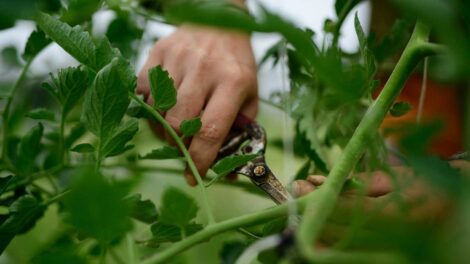
Office of Sustainability
Learn more about Sustainability at Lafayette and the different ways you can get involved.
Impact of their work addressing food access and security, nutrition education, regenerative ecosystems, and more was felt throughout Lafayette campus and Lehigh Valley community
By Stella Katsipoutis-Varkanis
This summer, Lafayette introduced new programs to advance sustainability initiatives both on campus and within the Easton community: the Landis/Office of Sustainability Fellowship and the Sustainability Impact Fellowship, which were made possible by the generosity of Capital Blue Cross and Heidi Hanson ’91, respectively. The students who stepped into those roles dedicated the last several months to addressing issues like food access and security, nutrition education, community welfare, innovative institutional change, and more.
“These summer positions provide students with real, tangible work experience that can catalyze change,” says Delicia Nahman, Lafayette’s sustainability director. “Research is a critical component of their fellowship experience, and they work with faculty and staff mentors to learn new skills. They’re also able to interface with a diverse group of stakeholders that they may not otherwise have during the academic year, which is an important professional and personal growth opportunity.”
And not only did these students learn from the experience, but their impact also was felt community-wide. Here’s a look at how their efforts over summer break made a difference.
Thanks to funding Lafayette received from Capital Blue Cross, three students participated in the Landis/Office of Sustainability Fellowship program. Over the course of 10 weeks and under the guidance of their adviser (engineering studies chair and associate professor Ben Cohen), Hanna Fish ’25, Claire Reid ’23, and Charlotte Vierling ’24 helped grow and harvest produce at LaFarm and Easton Urban Farm, which they then provided through various means to Easton community members who have limited access to healthy food. In addition to ensuring a portion of their harvest was distributed via the Kellyn Foundation to food-insecure community members throughout the Lehigh Valley, including at the West Ward Market, the students also hosted an educational stand at the West Ward Market and surveyed residents about their access to fresh produce, in partnership with the Greater Easton Development Partnership.
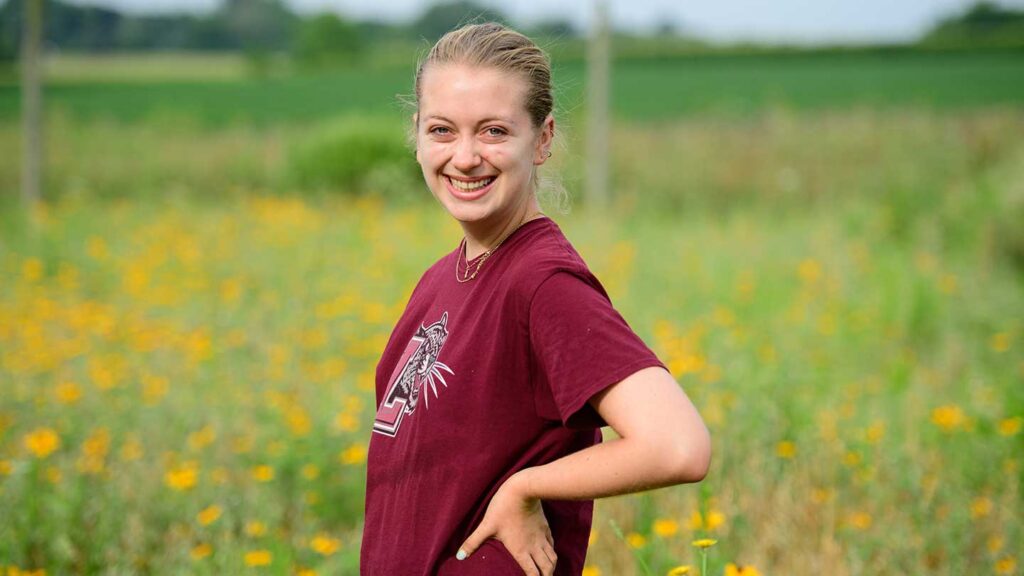
2022 Landis/Office of Sustainability Fellow Charlotte Vierling ’24
“This summer, the fellows helped produce over 1,500 pounds of produce that went directly into the local community,” says Josh Parr, Lafayette’s manager of food and farm. “They also grew 1,000 pounds of produce for campus, which went into the dining halls that were open over the summer, like Gilbert’s Café, and a weekly campus farm stand.”
The fellows’ commitment to their role left a lasting impression on not only Parr and local residents, but also the community partners they worked beside.
“Their enthusiasm and energy were contagious,” says Mark Reid, master gardener and farm manager at Easton Urban Farm. “They were always ready to share the load and help the farm help the community.”
“The fellows brought a fresh perspective to the West Ward Market, and we appreciate their energy and positivity,” adds Megan McBride, director of Easton Market District. “As a brand-new market in the community, it’s crucial that we establish as many partnerships as possible. LaFarm is integral to this project because of their history of addressing food insecurity in the West Ward, and the fellows were helpful in engaging and welcoming the market visitors, educating them about various vegetables and their uses, and assisting with market attendance counts and surveys. It’s also beneficial for the community to learn about LaFarm and their initiatives, including their extensive contribution of produce to the city’s food banks.”
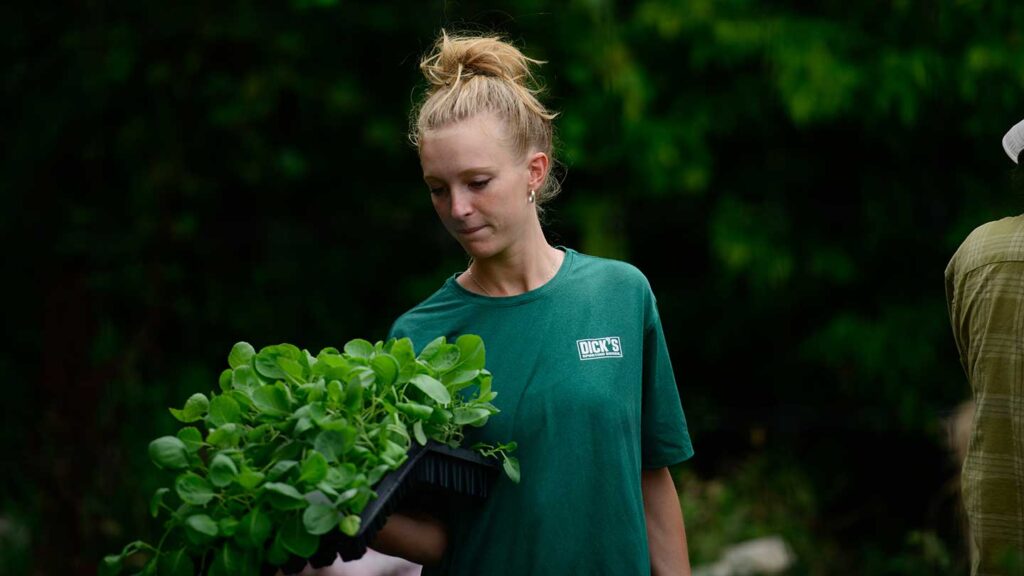
2022 Landis/Office of Sustainability Fellow Hanna Fish ’25
The fellows, in turn, were grateful for the chance to not only sharpen their farming and farm management skills, but also learn firsthand about the food systems and cultures in the city where they live and work. The opportunity these students had to develop their passion and talents in these areas in such a hands-on way is one that, Parr explains, is not easy to come by at other institutions—and it could serve them well into the future, no matter what career path they choose.
“I’ve been passionate about food injustice since I started working on a farm five years ago, and this opportunity allowed me to connect with a different community and address the issues elsewhere,” Fish says. “It also has given me communication skills I will carry with me.”
“As someone who has loved to farm and work with food, I’ve developed a huge appreciation this summer for understanding how food can unite an entire community,” Reid adds. “This amazing experience has helped me see the greater problem at hand in people’s need for food. I also worked with a community that I have been living in for three years, so it was sentimental for me to learn more about Easton and how I could help. I hope to go into this field in the future and work with larger cities to educate communities on where their food comes from and help get nutritious, affordable produce to people’s dining room tables.”
Vierling, who had limited agricultural experience before joining the program, says she appreciates how the fellowship helped her strengthen her research skills, community partnerships, and farming knowledge. “This summer exposed me to so much about food systems that I never would have learned in class. I’ve always had an interest in food production and security, so this fellowship helped me research this firsthand and make amazing connections with the Lafayette and Easton community. I’m so happy to have had this opportunity and to have accomplished so much with the other fellows.”
Hanson’s generous endowment led to the establishment of two Sustainability Impact Fellowship positions specifically aimed at catalyzing change on Lafayette’s campus: a Procurement Fellow (Jacqueline Cal ’22) and Campus Biodiversity Fellow (Madison Lebish ’23). Cal and Lebish worked alongside Office of Sustainability staff, as well as Lafayette employee stakeholders, as they undertook challenging, transformative projects designed to advance the College’s embodiment of its sustainability values while simultaneously offering a unique learning experience. With justice and equity at the core of their roles, Cal and Lebish worked on developing and furthering campus solutions such as sustainable procurement, zero-waste and circular value chain innovations, biodiversity, stakeholder engagement, and more.
The Sustainability Fellows also contributed to Green Move Out and the West Ward Sale, which helped divert over 20,000 pounds of necessities like clothing, furniture, books, and more from local landfills and funneled it to Easton community members at an affordable price. They also participated in the Easton Area Community Center summer camp (which was funded by the proceeds from the West Ward Sale), where they introduced local children to the importance of building a sustainable lifestyle.
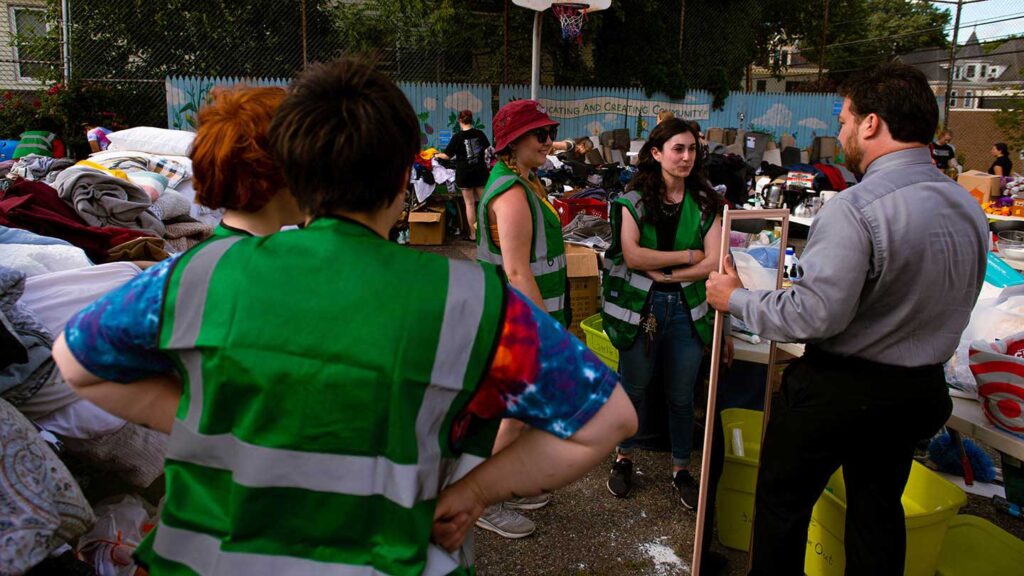
2022 Campus Biodiversity Fellow Madison Lebish ’23 (center) and Sustainability Outreach and Engagement Manager Samantha Smith (right) helping a customer at the West Ward Sale
More specifically, as Campus Biodiversity Fellow, Lebish spent the summer developing mapping and educational tools focused on biodiversity and regenerative ecosystem mapping for visitors and campus stakeholders. “My overall goal was to create an interactive online map of the 132 trees on Lafayette’s campus,” she says. “I started the summer finishing up an updated tree inventory one of my peers worked on last school year, so I could design and order name plates for all the trees on campus. This was my first step toward highlighting the beautiful biota of our campus for not only my peers, but prospective students and all our campus visitors. I spent the rest of the summer researching the trees, setting up the digital map, and exploring where else we could go with this virtual collection.”
Cal’s goal as Sustainable Procurement Fellow was to review existing campus documents and draft procurement policies for departments to drive tangible shifts in purchasing decisions to help improve the social and environmental impacts of the College’s supply chain. “I built a strong foundation understanding the layout and important aspects of sustainability policies,” Cal says, “and then identified our core principles to begin building the policy that best fits Lafayette. I also worked on Green Move Out and the West Ward Sale, which were meaningful and rewarding experiences as we got to see the Easton community benefit from the work we did.”
Partners across campus were excited to work alongside Cal and Lebish to help strengthen Lafayette’s sustainable practices. “I was impressed by Jackie’s commitment and passion, and her desire to make a positive impact on the campus and, in a broader sense, the community around us,” says Patricia Reich, Lafayette’s procurement director. “It comes down to collaboration,” adds David Kovach, assistant supervisor of grounds at Lafayette, who closely worked with Lebish. “By listening and learning from each other, you build a team that works together to problem-solve. In turn, everyone has increased success reaching their goals.”
Both Cal and Lebish appreciated the opportunity to work on projects that could impact Lafayette—and Easton at large—well beyond their time at the College.
“Being able to enjoy nature is a privilege and not a right,” Lebish says. “I hope the fellows and interns that come after me can use the interactive tree map as a tool to teach others about the importance and beauty of biodiversity here on campus and in general, and lead to further impact on the community. This fellowship gave me the opportunity to do something I was really passionate about, as well as learn new skills and improve upon others. I was able to explore the field I want to pursue, and I now have tangible work to show what I can contribute to the workforce. Most importantly, it taught me how important community is to me and reinforced that I want community to be a part of what I do in the future. I love to educate and give back to others, and this summer made sure that I pursue that.”
“I loved working with the Office of Sustainability because the work we do focuses on a greater purpose,” Cal says. “It has helped me build professional skills while also developing me into a greater member of the Lafayette community. I will carry what I have learned from this experience with me throughout the rest of my life.”
In addition to the new fellowship roles, the Office of Sustainability offered another way for Lafayette students to grow the College’s sustainability efforts and leave a lasting mark on the College Hill and Easton communities: Sustainability Internships.
Over the summer, Efrata Seifu ’25, Programming and Outreach intern, launched Sustainability Tours for alumni and prospective Lafayette students and families, which highlight key locations on campus that showcase the work being done by the Office of Sustainability. Elizabeth Dixon ’24, also a Programming and Outreach intern, planned and executed the Sustainability Summer Camp. In her role as Greenhouse Gas Emissions Reporting intern, Emily Bone ’24 calculated emissions from the campus fleet and created future projections for electrifying the College’s vehicles, in addition to calculating the impact of Green Move Out and the West Ward Sale. All of the interns also largely ran the College’s Green Move Out and West Ward Sale.
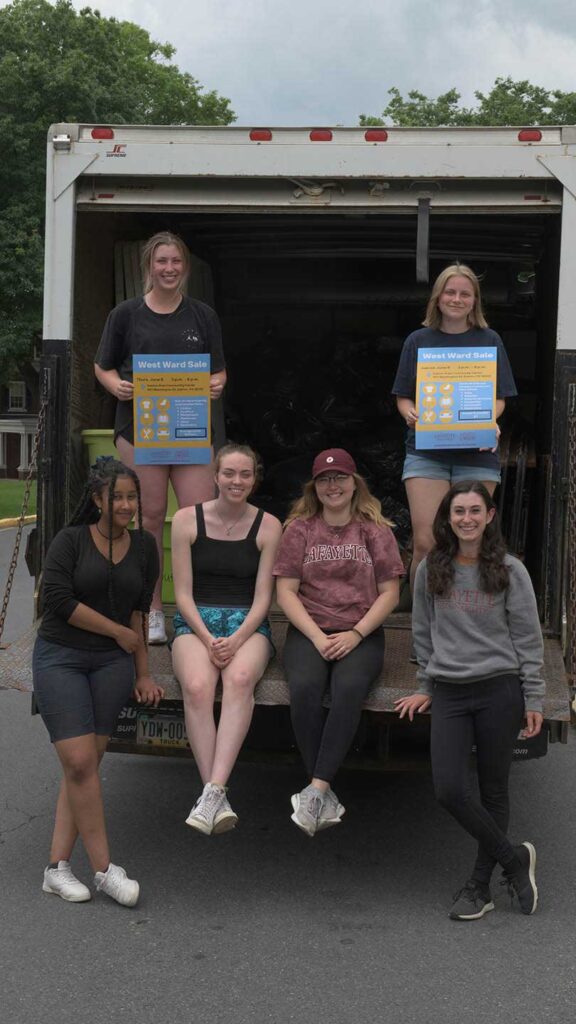
Top row, left to right: Jacqueline Cal ’22 (Procurement Fellow) and Elizabeth Dixon ’24 (Programming and Outreach intern); Bottom row, left to right: Efrata Seifu ’25 (Programming and Outreach intern), Emily Bone ’24 (Greenhouse Gas Emissions Reporting intern), Madison Lebish ’23 (Campus Biodiversity Fellow), and Samantha Smith (Sustainability Outreach and Engagement Manager)
“As a Programming and Outreach intern, I had the opportunity to not only work alongside a team that strives to generate multifaceted solutions to the problems in our communities, but also engage with the community within and outside of Lafayette,” Seifu says. “My work as an intern also has been a great opportunity for me to implement some of the theoretical knowledge I’ve gained from my classes as an economics major into real-life scenarios, which has been quite insightful. Overall, it has been a great way for me to broaden my horizons and explore a new perspective.”
“One of the things I loved about working as an intern was the amount of potential in the position,” Dixon says. “I was able to work on independent projects and gain confidence in my ability to talk about sustainability, while also learning from my manager and fellow interns. I’ve improved on important general skills, like communication and writing, which will come in handy no matter what my career ends up being. I also helped make our campus a better, more sustainable place. Addressing environmental issues is very important to me, so being able to make a change at Lafayette and Easton, my home for four years, is a special thing.”
“The experience was empowering,” Bone adds, “and I feel like I can create change.”

Learn more about Sustainability at Lafayette and the different ways you can get involved.